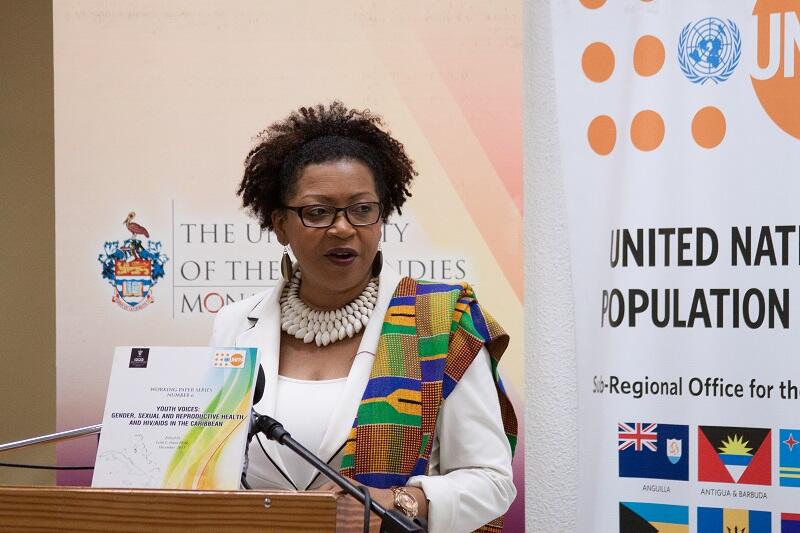2014 was an important year for UNFPA. There were several international conferences with which the SRO was actively engaged. Preparatory activities included advocating high level participation of government and civil society representatives from across the region, providing technical and financial support as appropriate to ensure that the voice of the Caribbean is represented when decisions about the Post 2015 development agenda are being crafted. Special areas of interest for UNFPA included population and development issues embracing gender equality and women’s empowerment, the needs and rights of adolescents and older persons, sexual and reproductive health and reproductive rights, migration and urbanisation and their link to sustainable development. Key events included the Commission on Status of Women (CSW) in March; the Commission on Population and Development (CPD) in April; the Special Session of the General Assembly and the Small Island Developing States (SIDS) conference in Samoa, both in September.
It was also the year in which the UNFPA Sub-regional Office for the Caribbean prioritized the needs of adolescents and youth and collaborated with regional institutions such as CARICOM, OECS and the UWI, to ensure that the rights of adolescents and youth especially girls are protected and they have a fair chance of fulfilling their true potential. Initiatives undertaken during the year included the development of an Integrated Strategic Framework to reduce the number of adolescent pregnancies in the English- and Dutch speaking Caribbean; a Legal Gap Analysis of Adolescent Sexual and Reproductive Health and Rights in the OECS, and a Draft Model Reproductive Health Care Services and Protection Bill.
The Caribbean office also launched the flagship publication, State of World Population 2014: The power of 1.8 billion, adolescents, youth and the transformation of the future which, demonstrates that young people have the potential to shape and lead the world’s future once the challenges they face are removed.
Working in collaboration with UNESCO, among other partners, UNFPA continued to assist countries with curriculum development for comprehensive sexuality education and training of teachers and other providers. UNFPA also continued to build capacity for the delivery of SRH services and create opportunities for the sharing of best practices through the provision of technical assistance and South-South Cooperation. Additionally, throughout the year, we facilitated young people’s participation in a number of regional and international events including the Youth Forum, which preceded the Third International Conference on the Sustainable Development of Small Island Developing States (SIDS) on August 28.
Here are further details:Professor Verene Shepherd, University Director, IGDS, Regional Coordinating Unit praised the young researchers for their contribution towards the development of evidence-based documentation around some key issues that are sometimes unrecognized.
“The value of this publication is also the excavation of gender-related data that allow for a deeper understanding of HIV/AIDS and the debunking of the myth that gender is irrelevant to how we understand this health-risk. Above all, it might be clichéd but no less true, that knowledge is power. When young people, especially, have knowledge about sexual and reproductive health, their engagement in risky sexual behaviour that could lead to HIV/AIDS and other STDs will decrease; and we have already seen the results” she noted.
Professor Shepherd said she was happy to see the shift in culture in the Faculty of Arts & Education , which now encourages publication by students even before they receive their undergraduate degree in keeping with what obtains in the Faculty of Medical Sciences and Science and Technology.
“The contributors are young voices, but important voices. They are pioneers in a way: entering and expanding the BSc major in Gender and Development; exposing their work even at this degree level in a culture where this is unusual and helping to break down barriers about who does gender work.”
UNFPA provided financial support to the Institute of Gender and Development Studies, Mona campus of the University of the West Indies to publish Working Paper Six : YOUTH VOICES: GENDER, SEXUAL AND REPRODUCTIVE HEALTH AND HIV/AIDS IN THE CARIBBEAN.
Speaking at the launch, Sheila Roseau, Director UNFPA Sub-regional Office for the Caribbean said partnerships are essential for effecting changes and in advancing the priorities of the region, partnerships.
“The world and the region look to academic institutions like UWI for critical thinking, creativity and innovation. So as we go forward in addressing the challenges that impact young people and the region in general, it is clear that we must engage these institutions and the young people who make up a large percentage of their student body for solutions.”
UNFPA Supports Evidence- based documentation of Gender, SRH and HIV and AIDS in the Caribbean through the Eyes of Youth
Sixteen former undergraduate students in the BSc Gender and Development Programme at the University of the West Indies, Mona campus who took the flagship course: GEND3600 Gender Sexual and Reproductive Health and HIV and AIDS were hailed as pioneers at their book launch: IGDS Working Paper # 6: Youth Voices Gender, Sexual and Reproductive Health and HIV/AIDS in the Caribbean in April 2014.
The students under the leadership of Dr. Leith Dunn, Head/Senior Lecturer, IGDS, Mona who also edited the publication, researched and compiled 17 papers examining a range of issues relating to sexual and reproductive health, gender and HIV and AIDS.
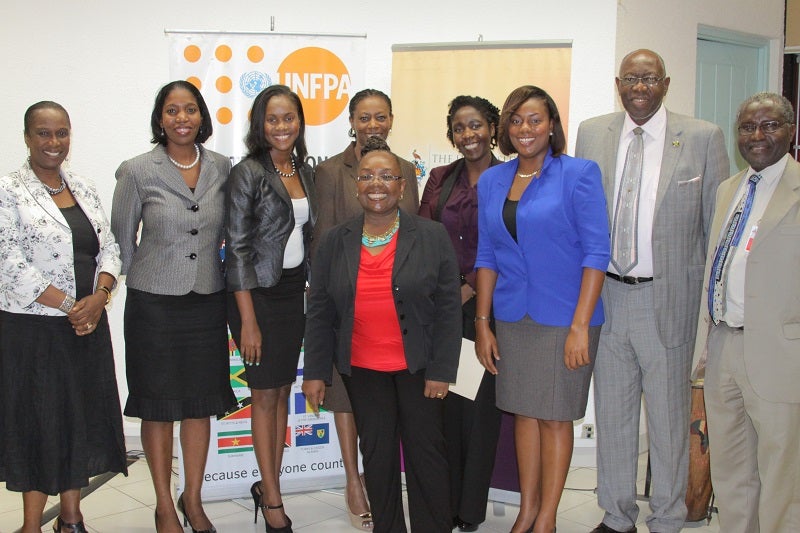
The launch was held on April 30 at the UWI Main Library Multi- Functional Room.
Link to PDF version of the publication.
Celebrating Women and Girls on International Women’s Day
Celebrating women and girls was the theme for the 2014 observance of International Women’s Day in the Caribbean. The Sub-regional office collaborated with the Women’s Resource & Outreach Centre (WROC), the Bureau of Gender Affairs and the Institute for Gender & Development Studies Mona Unit to host a Women’s Expo to mark the day on March 8 at the Under-croft and lawns of the Mona campus of the University of the West Indies.
The 2014 observance of International Women's Day took place on the eve of the 58th Session of the Commission on the Status of Women (CSW), which was held in New York with a focus on gender equality. The event therefore provided an opportunity to reinforce the fact that respect, protection, promotion and fulfilment of women’s human rights are necessary preconditions for improving the wellbeing of women and adolescent girls.
A large number of women turned out to participate in the various presentations and displays by several organisations and companies exhibiting and promoting their products and services.
· The event was coordinated to meet the following objectives:
· Provide a forum for engagement which empowers women from various sectors on a range of issues which will serve to empower and enhance their development
· Reinforce the importance of respect, protection, promotion and fulfilment of women’s human rights as pre-requisites for improving the wellbeing of women and adolescent girls.
· Raise awareness of the importance of women’s sexual, reproductive health and rights as well as information on services available to assist them in making informed choices
· Bring women and their supporters together in a space which will enable the sharing of information, resources and opportunities for networking between public and private sector companies, women’s organizations, female entrepreneurs, youth, community-based organizations, international organisations and academic institutions.
Several presentations on pertinent topics were conducted at the Under-croft throughout the day. These short 15 minute discussions on various topics related to women and gender equality were well attended. Topics included sexual reproductive health and rights, the marginalisation debate, financial wellness, child rights, menopause, sexual harassment and women's legal rights. There was also an entertainment package with several female artistes and other entertainment acts.
International Day of the Girl Child
The UN system in Jamaica in association with its Government Partners hosted a public forum to commemorate International Day of the Girl Child, on Friday, October 10, 2014 at the Knutsford Court Hotel, in Kingston. The Forum was held under theme 'Reducing Adolescent Pregnancy in Jamaica.'
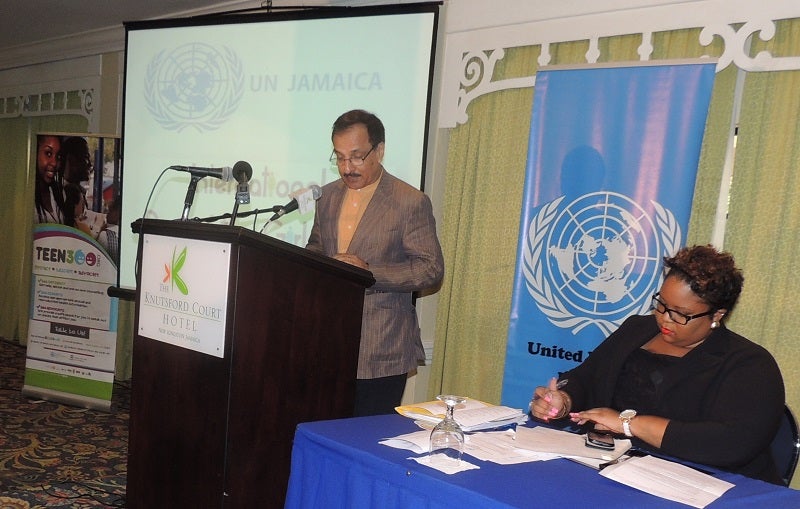
UNFPA used the opportunity to present the main pillars of the Strategic Framework for the Reduction of Adolescent pregnancy in the Caribbean to the large gathering of stakeholders Melissa McNeil-Barrett, Assistant Representative to Jamaica who made the presentation highlighted the following as outcomes of the strategy: Access to responsive SRH services, information and commodities, access to age appropriate, comprehensive sexuality education for young people in and out of school; implementation of social protection mechanisms for the prevention of all forms of violence against adolescent girls and boys, especially the poorest and most marginalized; and the adoption of common legal standards across the region concerning age of marriage and consent; prosecution of perpetrators of sexual violence; it is also expected that by 2019, Caribbean governments will systematically exchange knowledge, information and adopt good practices in addressing social factors that influence adolescent pregnancy.
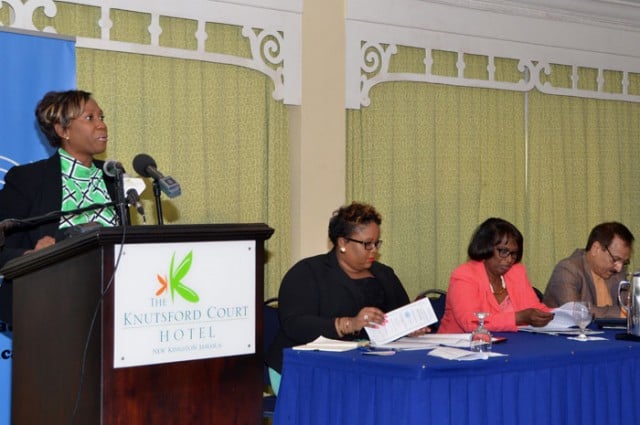
UN Country Team in Jamaica hosts High-Level Breakfast in recognition of the International Day for the Elimination of Violence against Women
On Tuesday, November 25, the UN Country Team in Jamaica hosted a High-Level Breakfast in recognition of the International Day for the Elimination of Violence against Women at Kingston’s Terra Nova Hotel. It targeted parliamentarians, leaders from civil society and the private sector. The event was also used to launch Eve for Life's 'Nuh Guh Deh Campaign' which aims to sensitize the public around sexual violence perpetrated against young girls and the links to HIV and AIDS, and encourage people to speak out about the issue.
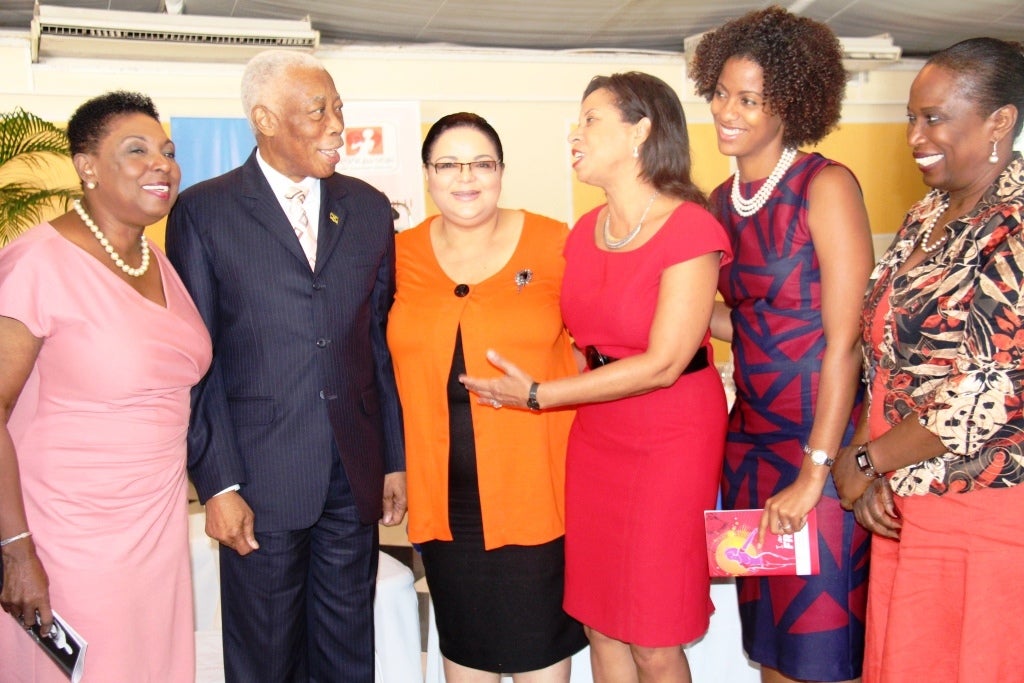
UNFPA Youth Advisory Group (YAG) members counsel their peers on adolescent pregnancy prevention in Belize
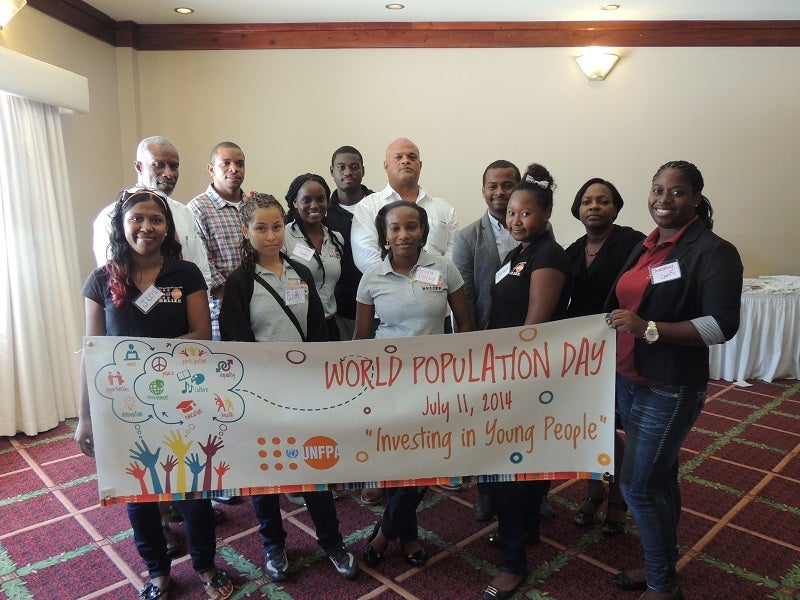
The UNFPA Youth Advisory Group (YAG), in support of UNFPA’s commitment to improving the lives of young people through access to age-appropriate, comprehensive sexual and reproductive health (SRH) information and services, carried out an adolescent pregnancy prevention outreach activity targeting young people in South-side Belize City. Locations visited between 16 August - 6 September 2014, included Wilton Cumberbatch Field, Constitution Park and ITVET Compound.
The objective of the outreach was to provide young people with important information about adolescent pregnancy including its consequences, impact on girls’ lives and ability to realize their potential. The Youth Advisory Group members also provided information about healthy sexual behaviours and lifestyles.
Over the course of these activities, an estimated 500 young persons between the ages of 13 and 19, teen parents and at-risk youth were engaged in a peer-to-peer basis on teen pregnancy prevention, with emphasis on healthy sexual behaviours and lifestyles. Pamphlets and other information concerning teenage pregnancy and other sexual health issues, including prevention of HIV/AIDS and other STIs, were also made available to them.
Youth Workshop on the Post-2015 Development Agenda in Belize
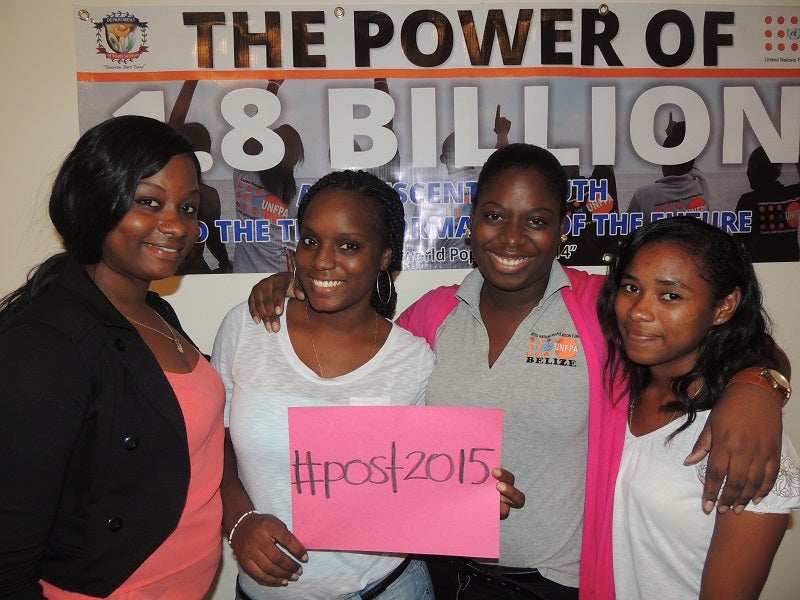
Youth participation is fundamental to the post-2015 process. Young people are being encouraged to lobby their government at the highest decision making level to recognize the Sustainable Development Goals (SDGs) as a perfect opportunity to target inclusive and sustainable growth that devotes more attention to higher standards and to outcomes that improve the quality of young people’s lives.
In light of this, the UNFPA Youth Advisory Group (YAG) in Belize, with support from UNFPA, hosted the first ever Youth Workshop on the SDGs and the Post-2015 Development Agenda in Belize. The objective was to enhance the capacity of young people to engage with the international agenda on the Post-2015 Development Framework, with a particular focus on reviewing major issues and initiatives related to youth in the post-2015 development agenda in Belize.
Through a series of thematic sessions with experts in the Post-2015 Development Agenda, 25 young persons from various youth organizations across Belize were sensitized about the Post-2015 Development Agenda and the SDGs, the ongoing process of consultations on this Agenda and the modalities of the decision-making process on the SDGs in Belize. In addition to the series of thematic sessions, participants held further discussions in plenary sessions and drafted a set of recommendations on issues affecting youth, which will inform development of a Post-2015 Youth Strategy for Belize.
This Strategic Youth Workshop on the SDGs and the Post-2015 Development Agenda in Belize took place on December 5 and 6, 2014, at the Chateau Caribbean Hotel in Belize City.
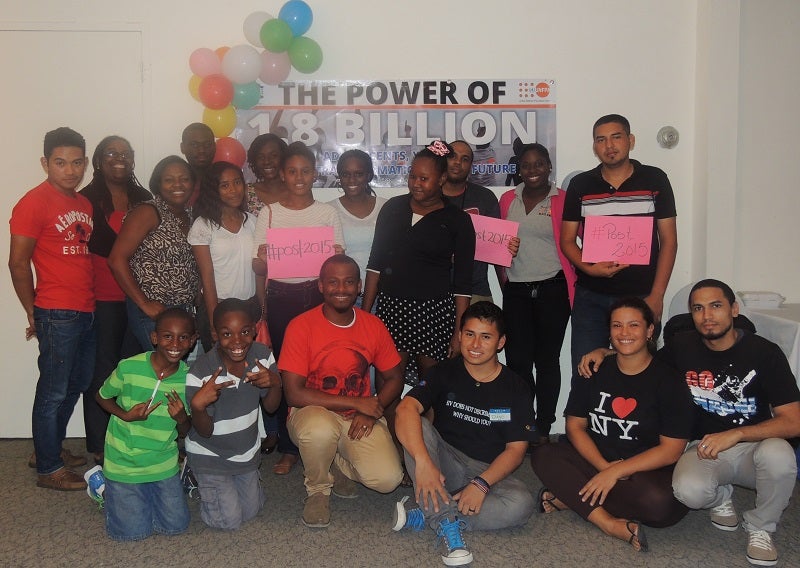
Support to strengthen delivery of comprehensive sexuality education/ Health and Family Life Education
Evidence has shown that comprehensive sexuality education that is age-appropriate, rights based, gender-sensitive and life skills-based, can help young people become valuable citizens by helping them to develop skills that will ensure a healthy and productive life.
In collaboration with UNESCO, among other partners, UNFPA assists countries with: curriculum development for comprehensive sexuality education; training of teachers and other providers to ensure that they: are comfortable with the topics covered, supportive, rather than judgmental, of young as well as older adolescents; able to provide accurate and full information, and knowledgeable about appropriate health services for referral of young people.
A partnership with CARICOM and UNESCO resulted in the development of a Peer Education System to support Ministries of Education in improving the quality of HFLE instruction and delivery in secondary institutions. A consultation involving twenty senior technocrats from eight teacher training colleges was held. The aim was to capitalize on opportunities for the institutionalization of quality HFLE instruction at these institutions with a view to sharing the lessons learnt with a wider array of teacher training institutions. UNFPA, SRO also supported the implementation of a South to South exchange between the Ministries of Education of Jamaica and Trinidad and Tobago. The exchange provided the opportunity for both countries to share experiences as Trinidad & Tobago seeks to strengthen its capabilities to implement the HFLE programme.
Building the capacity of young people to advocate around adolescent sexual and reproductive health issues
UNFPA continues to strengthen the capacity of young people to advocate around SRH
Issues. A capacity building workshop was implemented in collaboration with UNAIDS and UNESCO for 12 UNFPA Youth Advisory Group (YAG) members Barbados and five countries in the OECS. The young people were updated on the status of the SRH response in the region and were given tips on leadership, participation and advocacy. They were also provided with materials including the condom brochures and HIV cards to support behaviour change communication programmes with young people.in 2014.
UN Secretary General congratulates UN country team in Trinidad and Tobago on winning UN Cares Global Award
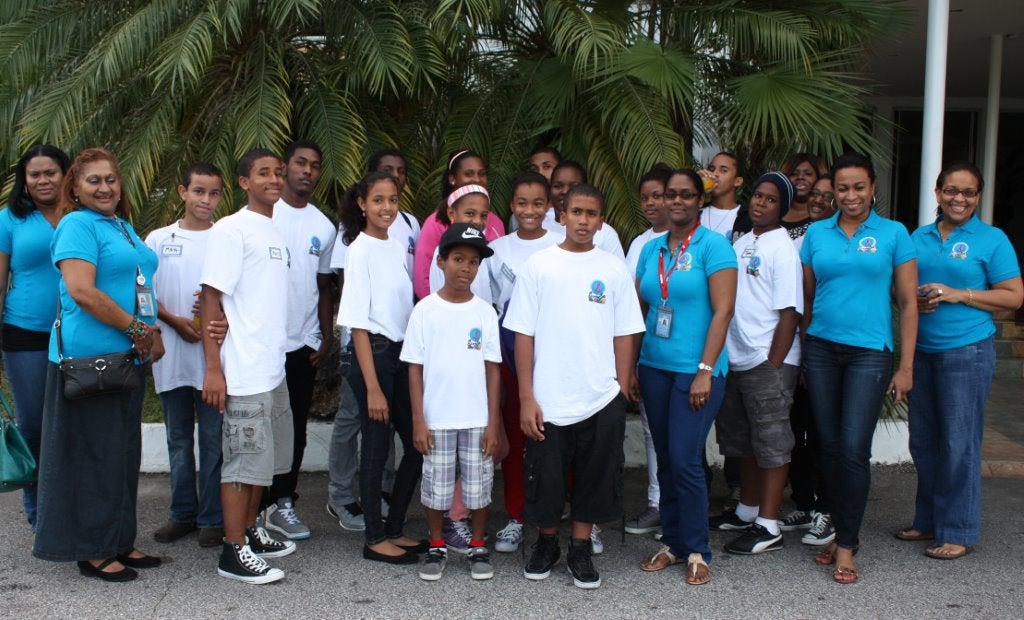
The Trinidad and Tobago (T&T) UN Cares team was one of 5 teams that won a Global Award in the UN Cares Award in 2014. The team’s winning entry was in the category, “Working with children and Adolescents.”
In his congratulatory message on December 1, 2014, The United Nations Secretary-General Ban Ki-moon thanked all UN Cares teams worldwide for their commitment to ending new HIV infections and AIDS related deaths; and to combatting the stigma and discrimination that often accompanies the disease. The Secretary General stated that when he launched UN Cares in 2008, he wanted the UN to become a “model workplace” in its handling of the challenge relating to HIV. Specifically he said the UN was required to do all it could to assist those with HIV including, by providing information, counselling and testing services for all who need it. He said the UN Cares volunteers through their creativity and invaluable efforts have been contributing significantly to the implementation of this vision.
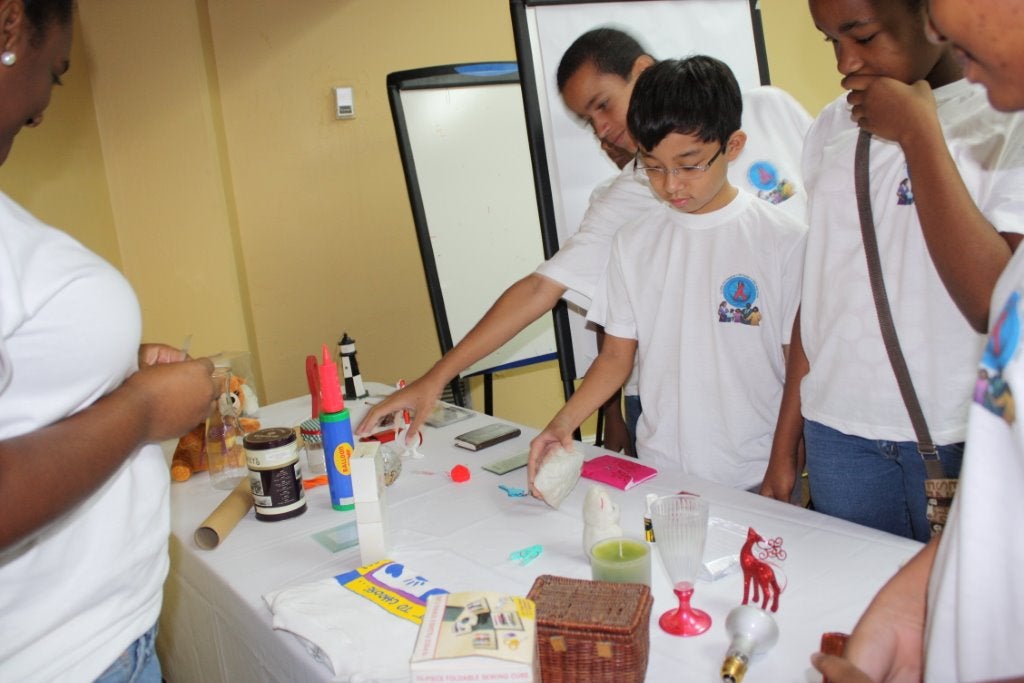
For the T&T UN Cares team, the wining project entitled , “ I am aware, not afraid “ focused on building and reinforcing positive life skills with the children of UN Staff, empowering them to take control of their health and wellbeing and enabling them to make informed choices towards the realization of their full potential. 28 staff dependants ranging in age form 10-19 years attended a one day retreat at the Chaguramas Convention centre. The activities comprised of whole group sessions as well as sessions where participants were separated into two groups by age to ensure that the information was specific and tailored to their needs.
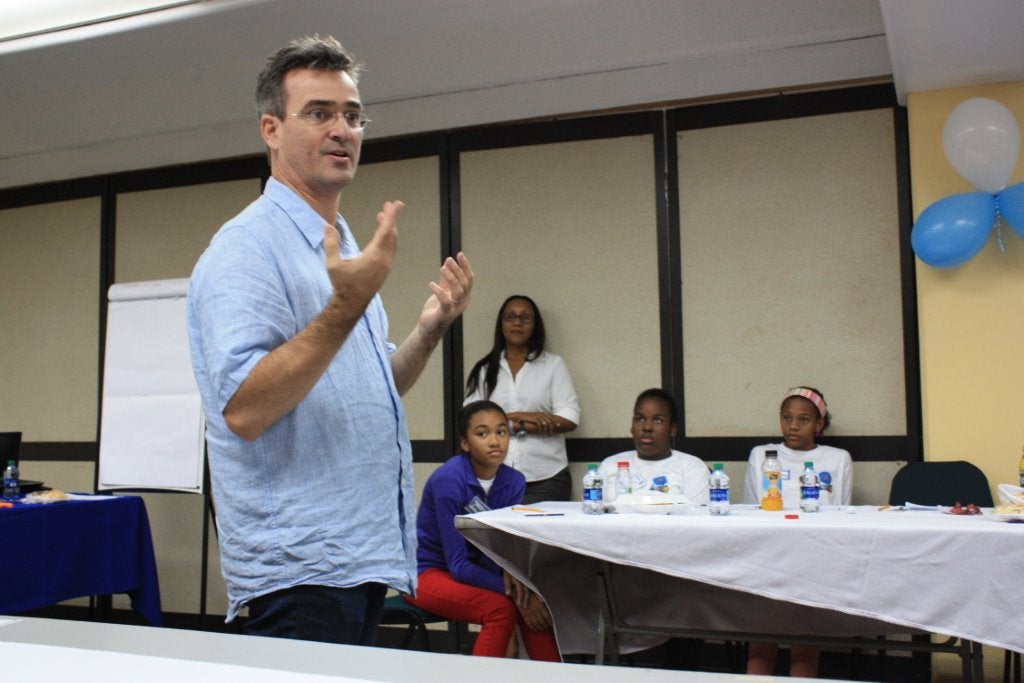
The UN Cares Award is a way to recognize the work of UN Cares teams all over the world who work hard to implement the UN Cares 10 Minimum Standards by sharing knowledge with their colleagues, making male and female condoms available in the workplace, supporting staff to know their HIV status, reaching families with information and skill-building, and addressing stigma and discrimination.
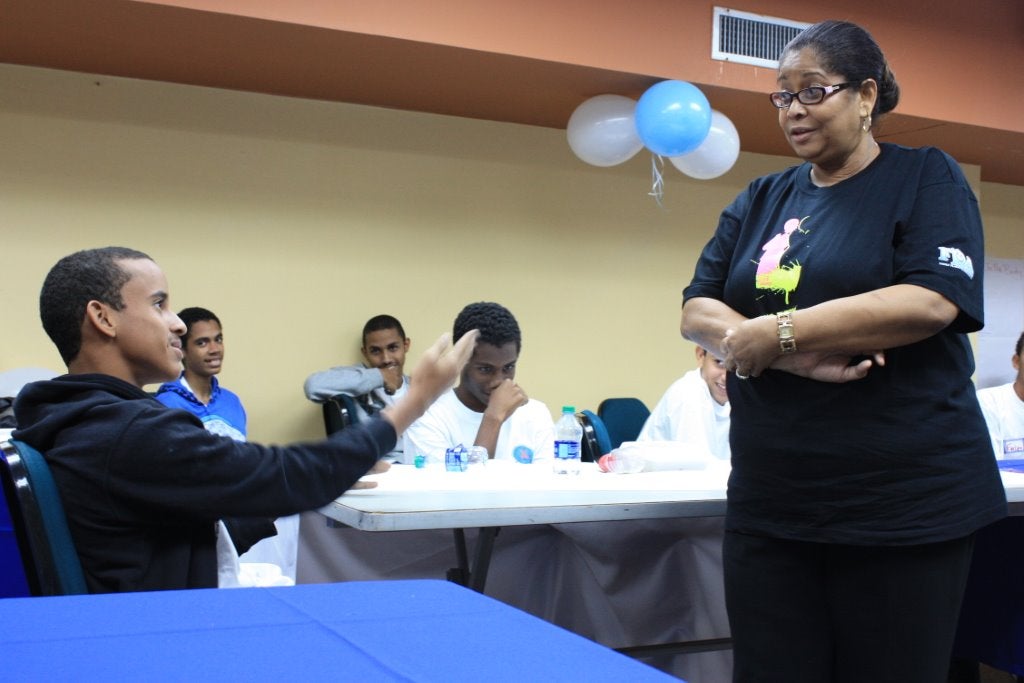
Winning teams received One thousand US dollars (USD 1,000) to be used for UN Cares activities in the country. Additionally, each member of the UN Cares teams that received an award or an honourable mention has received a certificate.
The UN Cares Award was first introduced in 2012 to recognize excellence in the work of UN Cares teams at country level.
Link to: http://www.uncares.org/UNAIDS2/content/un-cares-award-2014
State of World Population 2014 launch
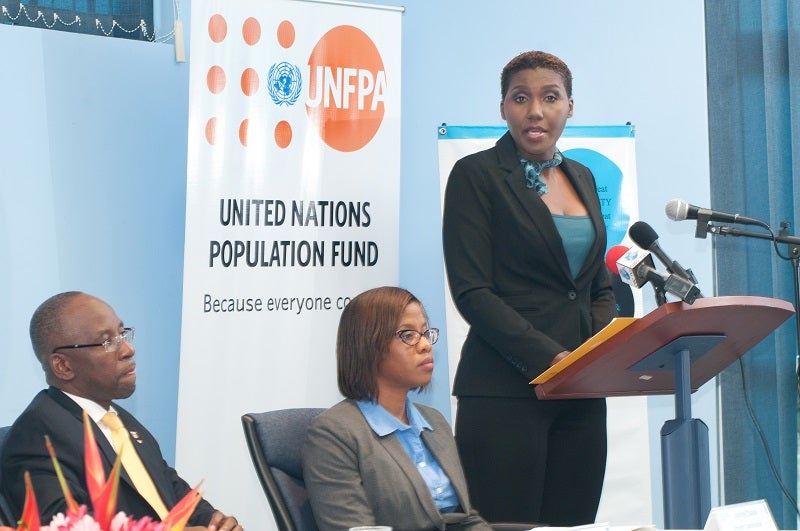
UNFPA partnered with the Ministry of Culture, Youth and Sports, and UNDP Barbados and the OECS in launching the State of World Population Report 2014: The Power of 1.8 Billion: Adolescents, Youth and the Transformation of the Future.
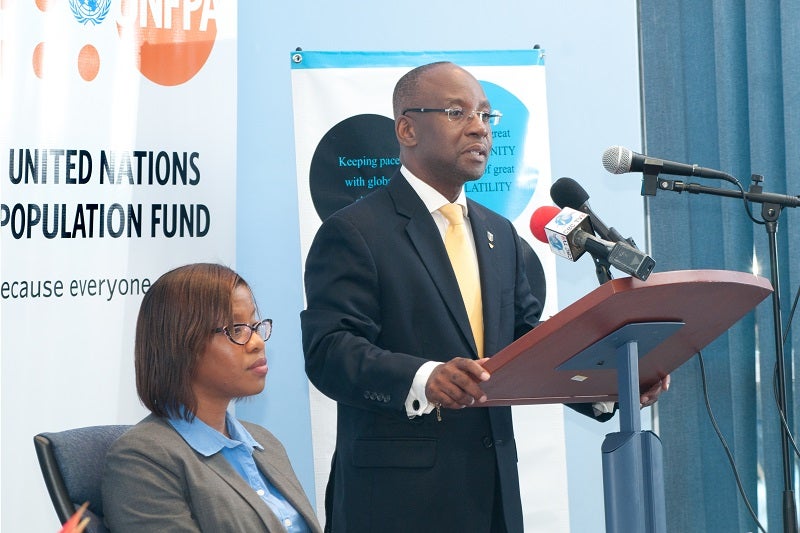
The report was launched by the Minister of Culture, Youth and Sport, The Honourable Stephen Lashley who highlighted that given the large population of youth in the Caribbean, reproductive health will continue to be an important issue for Barbados and OECS Member States in the post 2015 period. The launch was attended also by representatives of the Barbados Family Planning Association, youth representatives and advocates, and Directors of Youth Affairs from Barbados and the Eastern Caribbean. UNFPA took the opportunity also to introduce to the Directors of Youth Affairs and youth advocates the UNFPA CARICOM Integrated Strategic Framework for the Reduction of Adolescent Pregnancy in the Caribbean.
In Belize, the report was launched in collaboration with the Department of Youth Services (DYS), at a Breakfast meeting with the media at the Radisson Fort George Hotel and Marina, on Friday, November 21, 2014. The report was entitled
The objective of this breakfast meeting was to engage the media on the issue of investing in youth and to draw attention to the issues that challenge adolescents and youth well-being in Belize. Key note speakers at the launch included Ms. Erika Goldson, Assistant Representative, UNFPA, the Honourable Herman Longsworth, Minister of State, Ministry of Education, Youth and Sports, and Dr. Natalia Largaespada-Beer, Maternal and Child Health Technical Advisor, Ministry of Health.
Link to more SWOP 2014 Stories
GRPA and UNFPA Collaborate with the Ministry of Education in Guyana to deliver aspects of the HFLE curriculum in select schools
Secondary school students in Guyana highlighted their top priorities for a successful life and realizing their full potential through posters during a series of school town hall sessions held in five regions of the country. They included: Access to a good education, religious freedom, and opportunities; freedom from sexually transmitted infections including HIV and community engagement.
The sessions were organized jointly by the Guyana Responsible Parenthood Association (GRPA) and UNFPA in collaboration with the Ministry of Education. They targeted 3rd-5th Form students and involved teachers of the Health and Family Life (HFLE) curriculum. In Guyana, HFLE is part of the school curriculum and is delivered by trained teachers. The In-School Town Hall Sessions were conducted by GRPA Community Facilitators and Youth Volunteers with support from the HFLE teachers in the selected schools.
Topics covered during the discussion included: Values and values clarification in keeping with the Social Studies curriculum which explores definitions, distinctions and sources of values. They also discussed adolescence as a period of change. In this session facilitators led discussions on the biological, emotional and social changes in boys and girls during adolescence and their experiences during this period. Decision making was another theme that was explored with an emphasis on making good decisions and in this context, the issue of teenage pregnancy and its impact on a teenager’s life was discussed. Students were asked to work in groups to identify issues that were important to them and to depict these priorities using posters as the means of expression.
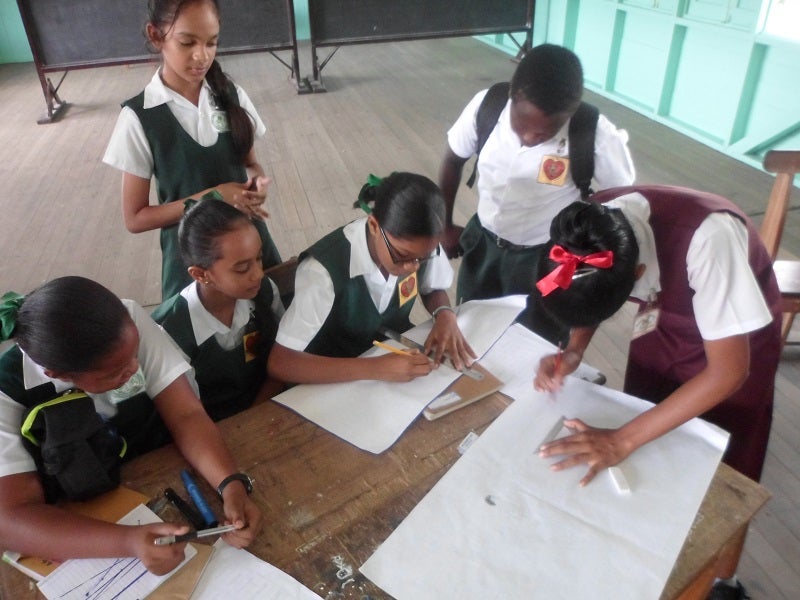
Facilitators used the posters and the young people’s identified concerns as the launch pad to discuss the changes during adolescence, adolescent pregnancy and the impact of early sexual initiation including unintended pregnancies and STIs. It is hoped that through the discussions the students who were drawn from 3rd – 5th Form were better equipped to make informed choices and decisions particularly for the prevention of adolescent pregnancies and STIs.

